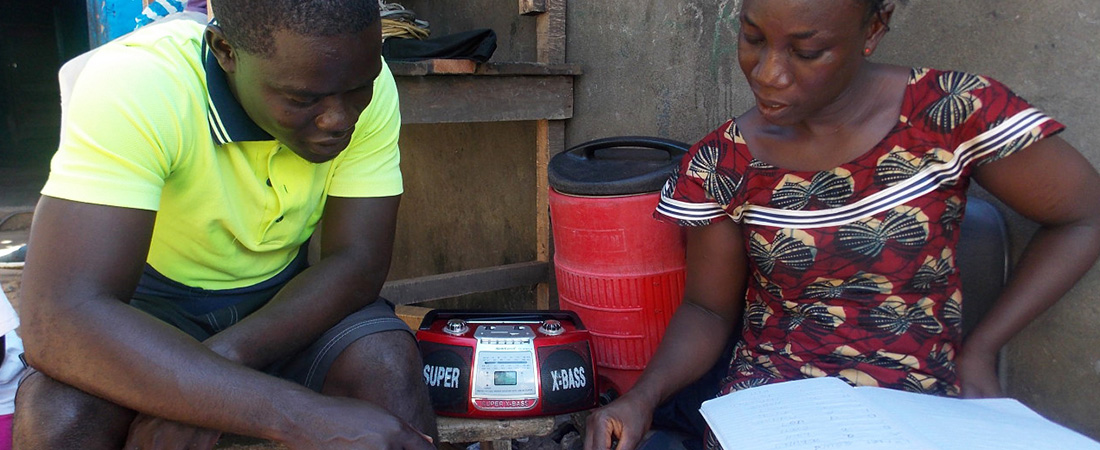Learning in the Time of Ebola

Radio programs are bringing learning to Liberia even during the Ebola crisis.
Throughout West Africa, the widespread outbreak of Ebola has placed regular life on hold. In an effort to prevent the further spread of the virus, curfews have been put in place. Commerce has slowed to a trickle. And schools have been closed since August.
But for students in EDC’s USAID-funded Advancing Youth Project in Liberia, learning has not come to a full halt. In an innovative response to a humbling health crisis, classes are continuing over the radio.
And across the country, students are tuning in.
“The [audio] program is really helping in a way to keep me listening and looking over my notes,” says Lucy Wallace, an Advancing Youth student from Montserrado. “We are not going to school, so the program is really helping us.”
Before the Ebola crisis took hold in West Africa, Advancing Youth was a vibrant education program serving nearly 12,000 people, mostly young adults who had dropped out of school. Classes met at night in community centers and schools.
Lisa Hartenberger Toby, EDC’s chief of party in Liberia, knew that the health emergency and the resulting closing of schools would have a huge impact on the learners that Advancing Youth had been trying to reach.
“Many of our communities have been hard hit by Ebola,” she says. “We worked with USAID to figure out what kind of support we could give to them, and we decided that radio instruction could work. Students can tune in daily as if they were attending classes. It can give them a sense of normalcy in a difficult time, while also helping them build the literacy skills that they have worked hard to develop.”
All ages tune in for learning
Currently, 10 community radio stations across Liberia are broadcasting the same lessons on basic literacy and numeracy that Advancing Youth students heard when they came to class. Students only need a radio, a workbook, and a “study buddy”—often a family member—to participate.
The broadcasts began on October 20 and are done in a serial format. One lesson is broadcast each morning and repeated again that night. EDC developed 128 audio programs for Advancing Youth classes—enough content to continue the broadcasts until the end of April if necessary.
To get the word out, an SMS text blast was sent out to all Advancing Youth students, alerting them to the broadcast schedule of the lessons. Radio stations have been running promotions too. The project also set up a telephone hotline for students to call in and offer feedback.
Hartenberger Toby says that the hotline has been popular, with many people calling in to request the workbooks that accompany the radio lessons. But one call sticks out in her mind.
“The lessons we are broadcasting are for our most basic learners,” she says. “But we got a call from one of the more advanced learners in the group. He said, ‘This stuff is all so basic—where’s the content for me?’ So people are clearly listening, and there’s a large appetite for what we are doing.”
Based on the program’s initial success, EDC is now working with Liberia’s Ministry of Education to develop radio-based content for children in grades 1, 2, and 3. Hartenberger Toby has found that even during this public health crisis, there is significant momentum behind finding ways to continue learning and teaching.
“In the midst of this urgent medical emergency, we can reach out to our students and offer them a way to safely continue their education,” she says. “In doing so, we hope that when classes resume, these radio courses will have helped students learn enough so they are ready for the next level.”
